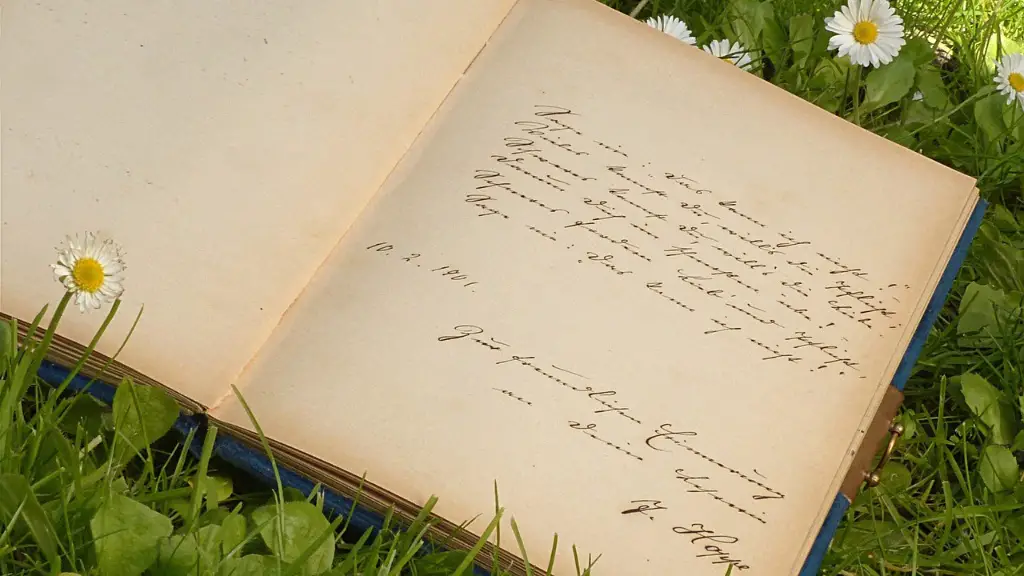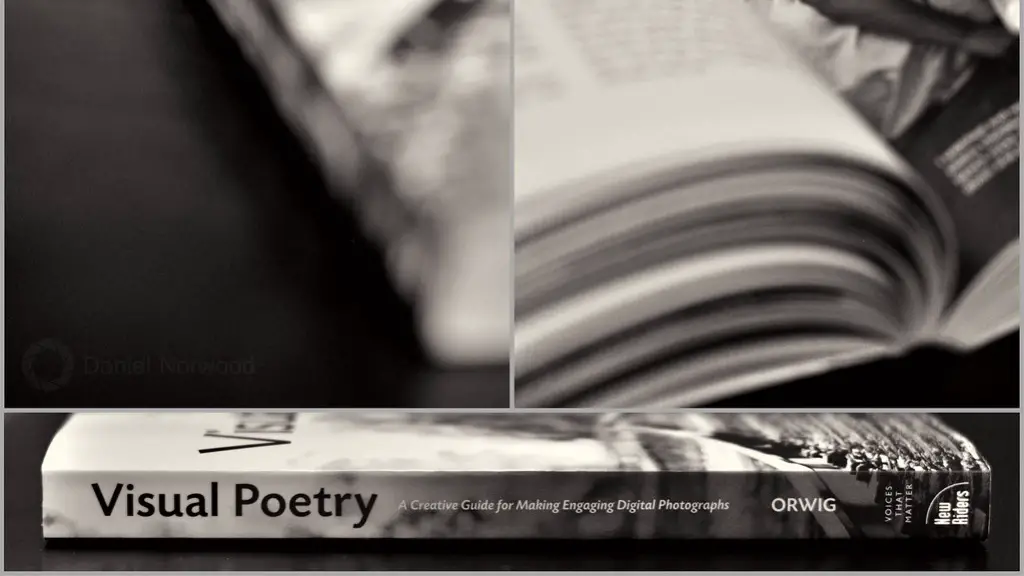Metaphysical poetry is a type of poetry that is characterized by its use of intellectual thought and figurative language. It is a style of verse writing that explores the ever-changing nature of reality, exploring the spiritual and abstract aspects of the world, instead of focusing on the material world. Metaphysical poetry is often emotionally charged and influenced by themes such as love and death, journeying from the physical world to the metaphysical. It is an attempt to link the visible and invisible worlds together, provide spiritual insight and discover truths about both realms.
The term ‘metaphysical’ was first used in the early half of the 17th century and was applied to a group of poets who wrote to explore and express the spiritual world. This group of poets included John Donne, George Herbert and Henry Vaughan. These poets wrote in a style of verse rife with sophisticated imagery and philosophical reflection. Their discernible style was different in that they combined traditional poetic structure with exposition of extended thought. This allowed them to further explore complex philosophical ideas.
Metaphysical poetry differs to most other poetry because it attempts to explore ideas and themes deeper than what is present at face value. It seeks to understand the intangible and metaphysical aspects of the world. The poems often explore metaphysical symbols and ideas such as mortality and divinity, the supernatural and the metaphysical. The themes of the poems tend to be more introspective in nature, often exploring the meaning of life and the power of fate. Metaphysical poems are often written in long and complex lines with intricate rhyme schemes, making them difficult to parse yet rewarding when done so.
Metaphysical poems also focus heavily on the use of complex symbolism. Images like that of a religious journey, for example, can help to express the complexities of faith and devotion to the divine. Other symbols, such as death and rebirth, explore the natural cycle of life, while plants and animals serve to represent the various stages of life. These symbols and imagery are often used to explain complex intellectual concepts, thus allowing for deeper and more meaningful exploration into the spiritual and abstract.
Themes of love, courtship, death and rebirth are also common in metaphysical poetry as they provide a way to explore the transient nature of life. Love is seen as being both painful and joyful, and death is a powerful reminder of the human condition. Through these themes, metaphysical poetry allows the reader to gain insight into the intricacies of the spiritual world. Metaphysical poetry also explores notions of divine intervention, unveiling the power of the higher power and their potential to spur personal transformation.
Generations after, a number of poets continue to use elements of metaphysical poetry in order to further articulate their ideas and explore the metaphysical unknown. William Blake and T.S. Eliot were two such poets who drew on the same themes, symbols and ideas in order to create powerful and meaningful works. Their works continue to inspire readers to think and explore politically and spiritually, and further challenges us to understand the complexities of life.
Origin and Evolution
Metaphysical poetry is primarily associated with 17th-century literature, particularly with a group of poets known as The Metaphysical Poets. The Metaphysical Poets group includes writers such as John Donne, George Herbert, Andrew Marvell and Henry Vaughan. The origin of metaphysical poetry is attributed to the works of these writers. The term “metaphysical” was coined by Samuel Johnson to describe their greatly abstract and philosophical style and their deeply religious themes.
Though, in spite of its roots in 17th-century literature, the influence of metaphysical poetry can still be seen in contemporary poetry. William Blake and T.S. Eliot are two of the most notably contemporary metaphysical poets, who both use complex symbolism and thought-provoking concepts to draw the reader into the metaphysical world. The styles and themes of many modern poets have been heavily influenced by the works of the metaphysical poets, and it is still used as a powerful tool to provoke spiritual thought and illumination.
Indeed, metaphysical poetry has evolved over time. As the ideas, culture, and technology have changed over time, so have the ways in which metaphysical poetry is expressed. In the same way that the works of the metaphysical poets shaped the poetry of the past centuries, today’s metaphysical poetry is also shaped by the current state of the world. Consequently, metaphysical poetry still remains a widely used and powerful form of expression, both for the contemporary reader and untraditional spiritual thinker.
Reference in Pop Culture
Metaphysical poetry has been referenced in various forms of popular culture over the years, particularly in film and television. In the movie ‘Dead Poets Society’ (1989), John Keating (played by Robin Williams) introduces his students to the works of the metaphysical poets in order to help them to understand the power and beauty of poetry. In the series ‘Fringe’ (2008-2013), the metaphysical poet John Donne is referenced throughout Season 3, in part used to explain the themes of transcending death and transcendence.
Though metaphysical poetry is not as widely referenced in modern day popular culture, its influence can still be seen in the works of authors and filmmakers. The symbolism used by many storytellers for their characters and themes are often rooted in metaphysical ideas, as are their critiques on the transient nature of life. Even contemporary songwriters often draw reference from metaphysical poetry, as can be seen in the works of Bon Iver and Sufjan Stevens.
The Future of Metaphysical Poetry
It is fair to say that the future of metaphysical poetry and the exploration of the metaphysical realm is likely to look different to what it has in the past. With changing attitudes towards religion and spirituality, it is likely that the themes of metaphysical poetry are likely to become increasingly varied and dynamic. For example, some poets may explore the scientific approach to understanding the spiritual self in deeper ways than in the past, and others may take on a more philosophical approach, moving away from a more religious perspective.
Ultimately, metaphysical poetry has the potential to remain relevant and impactful for years to come. The themes of the metaphysical world and the use of symbolism to explore those themes are still deeply effective and emotionally stimulating. Metaphysical poetry is still a powerful tool for exploring the spiritual world and encouraging spiritual growth, and will no doubt continue to captivate and enthral readers for years to come.
Connections to Other Disciplines
Metaphysical poetry also has the potential to be linked to disciplines beyond the sphere of poetry or literature. In particular, it is possible to draw various connections between metaphysical poetry and psychology, philosophy, and even art. Metaphysical poetry’s exploration of the metaphysical realm through symbols, images, and concepts makes it a useful tool for exploring the inner self and understanding one’s own philosophies and perspectives on the world.
The works of the metaphysical poets in particular, are also useful when looking at the influences of other disciplines. The poets’ focus on exploring the metaphysical world through symbolism and images is capable of captivating both traditional poets as well as contemporary writers, inspiring them to use their own prose and works to explore the spiritual realm. Consequently, the works of metaphysical poets can be seen as influential to many other disciplines, inspiring cross-disciplinary thinking.
Impact of Metaphysical Poetry
The influence of metaphysical poetry on literature, art, and beyond is undeniable. Despite the fact that its roots date back to the 17th century, it has found its way into modern works of art, music, and literature. It continues to provoke thoughtful spiritual contemplation and encourages people to dig deeper into the metaphysical unknown. This makes it an invaluable tool of expression, allowing the reader to gain insight into the complex spiritual world and ultimately discover something about themselves.
In addition to its influence in art and literature, metaphysical poetry also has a place in popular culture. It is referenced in various forms of popular culture to this day, from movies to books, and even music. Such references to metaphysical poetry demonstrate its continued relevance and influence in contemporary society, and its power to captivate, amuse and enlighten readers worldwide.
Overall, the influence of metaphysical poetry has been vast; both in terms of its influence in philosophical thinking and artistic expression. It has withstood the test of time and continues to excite, captivate and challenge readers today. With its potential to explore new notions of the unknown, metaphysical poetry has proven to be a much needed tool for spiritual enlightenment.




